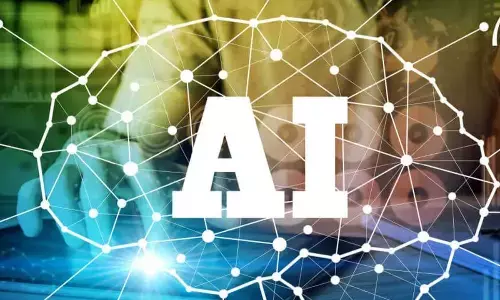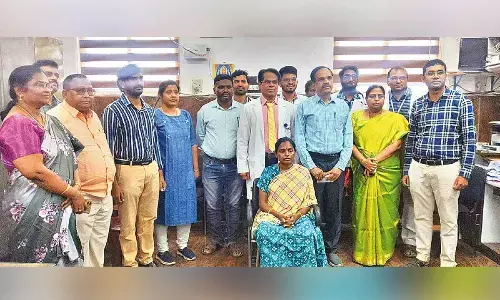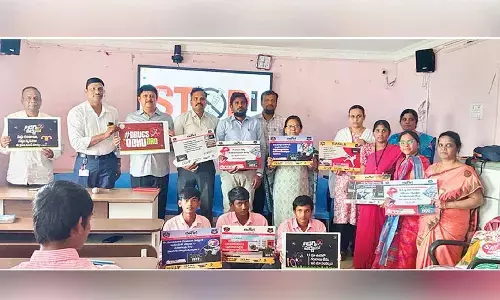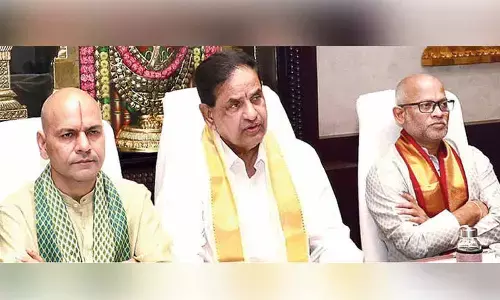How skill India is empowering workers to become employable?
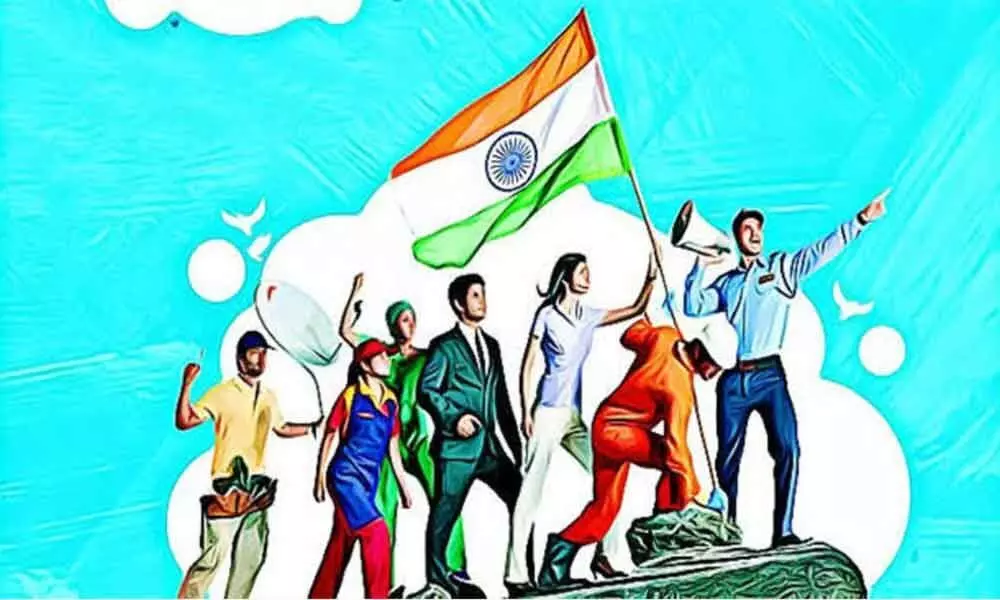
Initiatives are underway to promote a culture of innovation based on entrepreneurship which can generate wealth and employment for all citizens.
Initiatives are underway to promote a culture of innovation based on entrepreneurship which can generate wealth and employment for all citizens.
Skills and knowledge drive economic growth and social development of a country. Nations with higher levels and better standards of skilled workforce are able to deal with challenges and opportunities in domestic and global markets.
India currently ranks among the fastest growing economies globally and is celebrating demographic dividend with two-thirds of 1.3 billion people under the age of 30 years. The country aspires to be an economic superpower and contribute about 25 percent of the world's total workforce by year 2025.
On the other hand, 500 million skilled workers will be required in the next five years - especially in manufacturing. A big challenge lies ahead, however, as estimates show that only 4.69 percent of the workforce has undergone formal skill training.
More worryingly, over 30 percent of youth aged between 15 to 29 years are 'not in employment, education or training,' according to Organisation for Economic Cooperation and Development (OECD). 'Not in employment' refers to those who are not searching for jobs either due to unavailability or because there are no jobs to match their skills.
With a million people entering workforce every month, India has embarked upon the world's largest human resource development exercise. For the first time in 68 years of Independence, the Ministry of Skill Development and Entrepreneurship (MSDE) has been formed to focus on enhancing employability of skills.
On July 15, 2015 Prime Minister Narendra Modi launched the ambitious Skill India initiative to empower youth from different sections of society for building a New India. The country has immense potential to emerge as skill capital of the world with focus on employment generation enabled through Make in India and Skill India.
The MDSE has undertaken significant steps and reforms to drive this in terms of formalising the policy, framework and standards; launching new programmes and schemes; creating new infrastructure and upgrading existing institutions; partnering with states; engaging with industries; and building societal acceptance and aspirations.
For a better tomorrow
The initiatives are not just leading to real stories of transformation and achievements, but of hope and enlightenment as well for every young Indian a better tomorrow.
The National Policy on Skill Development - announced on July 15, 2015 - aims at creating an ecosystem of empowerment by skilling on a large scale at speed with high standards and promoting a culture of innovation based on entrepreneurship which can generate wealth and employment to ensure sustainable livelihoods for all citizens.
To begin with, the MDSE held extensive discussions from October 2015 to September 2016 with various ministries and departments to gauge training needs in 34 sectors. The findings highlight growing skill gap and estimated training need during 2017 to 2022 with top 10 sectors accounting for 80 percent of all requirements.
A National Priority Skill Action Plan (NPSAP) is underway to define job roles and implementation strategy to achieve targets envisaged in the Skill Action Plan. The NPSAP is being prepared in consultation with 41 ministries and departments across 25 sectors. Its first volume published on January 31, 2017 comprises of seven sectors: agriculture, electronics, IT and ITes, telecom, textiles, food processing, and logistics.
NSDC's role: National Skill Development Corporation (NSDC) is a unique public-private-partnership which acts as a catalyst to ensure better quality of life to the youth by creating new avenues of employment for them through short term training courses through an intensive network of its training providers. NSDC is responsible for funding and implementation of schemes and programs under Skill India Mission and also creating linkages for jobs through industry partnerships. Last year, NSDC had approved a total of 290 projects and transformed the lives of nearly 10.18 lakh candidates by providing them skill training in more than 2000+ job roles through 5224 training centres in 514+ districts across the country.
PMKVY scheme: The Pradhan Mantri Kaushal Vikas Yojana (PMKVY) is the flagship skill training scheme of the Ministry of Skill Development and Entrepreneurship. The objective of this skill certification and reward scheme is to enable and mobilise a large number of youth to take up outcome-based skill training to become employable and earn their livelihood. The scheme was launched by Prime Minister Narendra Modi on July 15, 2015 to coincide with the World Youth Skills Day. Owing to its successful first year of implementation, the Union Cabinet has approved the scheme for another four years (2016-2020) to impart skilling to one crore youth with an outlay of Rs 12,000 crore. It is being implemented through the National Skill Development Corporation (NSDC).
The PMKVY (2016-2020) Scheme will be implemented by the Centre along with states. It will have two components:
*Centrally Sponsored Centrally Managed (CSCM): 75 per cent of the PMKVY (2016-2020) funds will be available to the ministry for skilling through the NSDC.
*Centrally Sponsored State Managed (CSSM): 25 percent of the funds of PMKVY 2.0 will be allocated to the states.
The short-term training imparted at PMKVY centres benefits those who are either school/college dropouts or unemployed. Apart from providing training according to the National Skills Qualification Framework, these centres also impart training in soft skills, entrepreneurship, financial and digital literacy.
After successful completion of their assessment, candidates are provided placement assistance by training partners. The entire training and assessment fees are paid by the government.
Individuals with prior learning experience or skills are assessed and certified under the Recognition of Prior Learning (RPL) component of the scheme. RPL aims to align the competencies of unregulated workforce to the National Skills Qualification Framework. Project implementing agencies like sector skill councils are being incentivised to implement RPL projects.
The special projects component of PMKVY envisages creation of a platform to facilitate trainings in special areas for government bodies, corporate or industry bodies.
Udaan scheme: Udaan is a special initiative to address the needs of educated unemployed in Jammu and Kashmir. The aim is to provide skills and job opportunities to graduates, post-graduates and three-year diploma engineers. The programme provide exposure to corporate India towards rich talent pool available in the state. The target is to reach out to 40,000 youngsters over a period of five years.
Till November 30 last year, a total of 24,312 candidates had joined training of which 5,480 were undergoing training in 18 cities across India. A total of 17,111 candidates had completed training of which 9,632 were offered job in various sectors like retail, IT and ITes, manufacturing, banking, financial services and insurance (BFSI), auto, real estate, infrastructure, and textiles.
Re-energised it is: Industrial Training Institutes (ITIs) under Directorate General of Training (DGT) play a vital role in providing vocation training to craftsmen. More than 13,350 ITIs with seating capacity of 28.47 lakh have been imparting skills for 126 trades. To re-energise the existing ecosystem, 1,381 new it is have been added with over five lakh seats.
A grading scheme has been introduced to create a benchmark for comparison among various institutes and identify areas for improvement. Management committees have been formed to forge partnerships between ITIs and apex industry bodies that will facilitate graduates in getting placement in different industries.
At the same time, curricula are being updated regularly to equip the youth with multi-skills as per requirements of fast-growing sectors and make the workers more productive. Soft skills including English speaking and computer literacy have been made an integral part of all skill development trainings.
On the other hand, DGT, MSDE and National Institute of Open Schooling (NIOS) under Ministry of Human Resource Development joined hands to put in place a system for academic equivalence to ITI qualification and provide options to meet aspirations of those candidates of ITI system who want to attain high academic qualification in addition to their skills. This partnership has opened pathways for ex-trainees of ITI, holding National Trade Certificate (NTC), to earn secondary/senior secondary qualification. Under the MoU following arrangements have been made: a) Dual system of training (training both in ITI classrooms and in industries b) Space Based Distance Learning Program (SLDP) for MSDE.
International exposure: The MSDE is actively engaging with foreign government and institutions to share best practices, benchmarking standards and training of trainers to enhance capacity of India's skill training eco-system. A total of 16 India International Skill Centres (IISCs) have been launched to prepare the youth for job opportunities in global markets. The number will go up to 100 by 2017-end. These IISCs will be equipped with lab infrastructure to deliver International benchmarked training and certification programmes. The centres are being setup at overseas migration pockets for equipping trainees looking to migrate overseas.
The IISCs will facilitate placement linkages to international countries through direct tie-ups with employers or recruitment agents approved by the Ministry of External Affairs. The centres will also undertake implementation of the PMKVY and Pravasi Kaushal Vikas Yojana (PKVY).
Apart from domain skill training, pre-departure orientation training will spread awareness and help trainees understand about opportunities and challenges involved in migrating overseas for work. It will sensitise trainees on digital literacy, culture and language of the destination country, thereby enabling better adjustment in a new environment.
Importance of apprenticeship: You must remember that apprenticeship is among the most efficient ways of acquiring industry-ready skills by using facilities available in production establishments. Apprenticeship training consists of basic training component and practical training according to prescribed syllabus for each trade.
There are five categories: trade apprentices, graduate apprentices, technician apprentices, technician (vocational) apprentices, and optional trade apprentices. The National Apprenticeship Promotion Scheme (NAPS) aims to increase engagement of apprenticeship from 2.31 lakh to 50 lakh cumulatively by 2020.
The schemes entails reimbursement of 25 per cent of prescribed stipend to all apprentices with the employers. There is a cap of Rs 1,500 per month per candidate. Nearly 10 lakh apprentices are likely to be trained in 2017-18, 15 lakh in 2018-19 and 20 lakh in 2019-20. About 20 per cent of them will be fresher apprentices.
A user-friendly online portal www.apprenticeship.gov.in has been launched for easy processing of applications by employment seekers and employers.
Transforming lives, inspiring change
Skill India is paving the way for a brighter tomorrow for every young Indian that is joining this revolution, not only as candidates but as trainers too. These are not just stories of transformation and achievement, but of hope and enlightenment for every potential youth seeking the right direction.
Hemant Jha, Bihar: Life Sciences Sector, PMKVY candidate: One of the top demanding sectors is Life Science which is growing at a CAGR of 17%, but it is still facing a shortage of skilled work force across functions and levels. We brought an inspiration right from the heart of this emerging sector.
Meet Hemant Jha. Until PMKVY happened, he was just another young man of Katihar district, Bihar. Who knew one skill training with PMKVY will change his life so drastically. He was trained under PMKVY's Life Science Skill Development Course which groomed him to become a successful medical representative. PMKVY transformed him from an unemployed young man to a rising employee at one of the top international healthcare brands Sun Pharma. As his dreams found wings, his home found a stronger foundation.
Nitya Devi Nohotiya, Tripura: Rubber Plantation: PMKVY candidate
Skill India has seen huge participation from the women in the country that will eventually translate into the country's economic growth. In the last 3 years, more than 3 lakh women have been trained to earn their livelihood. A small training transformed their lives. From ordinary women, they emerged to become their own heroes. This success story comes from the eastern end of the country. Who thought a regular tribal woman from a remote village of Tripura would do something that'll change the way people look at cultivation? Traditional cultivation was not enough then, it isn't enough now. That's why when an entire village struggled to make the ends meet; she understood it was time to bring a change and she did.
Nitya Devi Nihotiya, one of the PMKVY candidates chose a path less travelled. Her efforts paved the way and brought her to PMKVY's Rubber Plantation Training, after which she started Rubber Planting Nursery. This nursery opened doors of profits up to Rs.4,000 per month. Not only she is grateful to PMKVY, but elated to share her experience as to motivate others who are in need of right direction.
Poonam Kumari and Komal Kumari, Textile Sector, PMKVY candidates
Another such story is of two sisters Poonam and Komal. Their plight didn't stop them to change their life. Broken dwellings, pity conditions and no funds to continue their education was the scenario they wanted to change. And, it happened after they pursued a skill training course from PMKVY. The change was gradual but strong which turned them into textile company employees. Not only they happily support their families now but have become a role model for women who want to be financially independent through their skills.
(Based on Inputs from National Skill Development Corporation)
Source: Employmentnews










